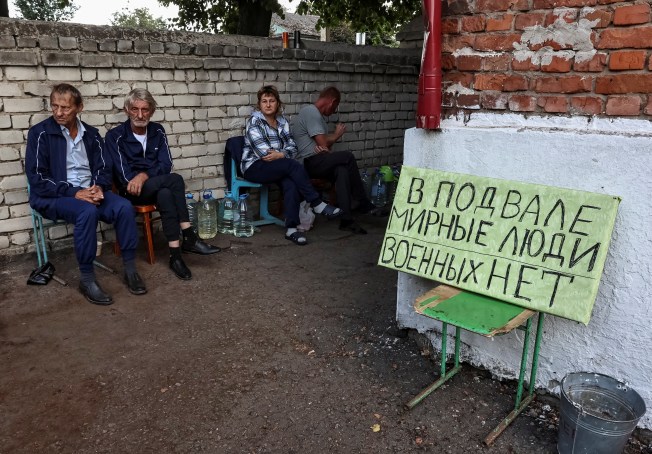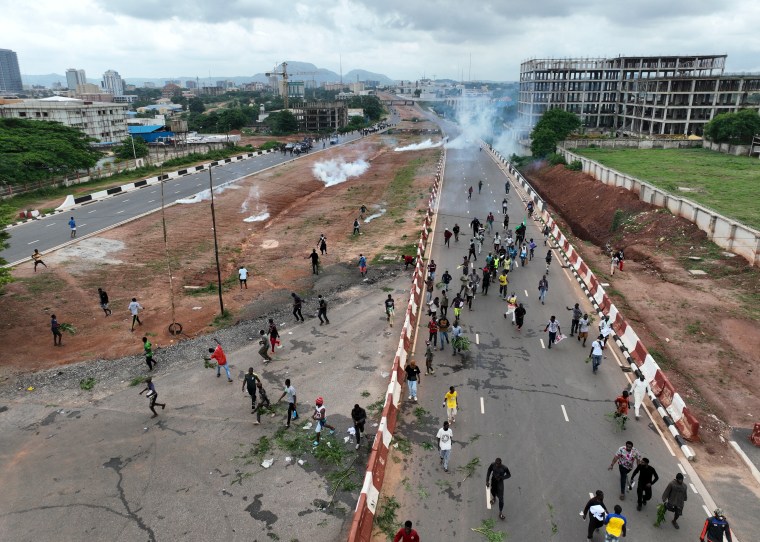The Torch is a weekly newsletter from the Committee to Protect Journalists that brings you the latest press freedom and journalist safety news from around the world. Subscribe here.
“He hit me with a gun butt,” Premium Times newspaper reporter Yakubu Mohammed told the Committee to Protect Journalists (CPJ), recalling how he was struck by a police officer while reporting on cost-of-living protests in Nigeria’s capital of Abuja on August 1. Two other officers beat him, seized his phone, and threw him in a police van despite him wearing a “Press” vest and showing them his press identification card.
Mohammed is one of at least 56 journalists who were assaulted or harassed by security forces or unidentified citizens while covering the #EndBadGovernance demonstrations in Nigeria, one of several countries across sub-Saharan Africa that have experienced anti-government protests in recent months.
In a new feature report, CPJ’s Evelyn Okakwu documents recent actions against journalists in Nigeria that are emblematic of the dangers faced by reporters in many African countries during protests.
Last year, CPJ found that more than 40 Nigerian journalists were detained, attacked, or harassed while reporting on presidential and state elections. In 2020, at least a dozen journalists were attacked during the #EndSARS campaign to abolish Nigeria’s brutal Special Anti-Robbery Squad (SARS) police unit.
Read CPJ’s analysis of the attacks on the press during protests in Nigeria.
Global press freedom updates
- Vietnam sentences blogger Nguyen Chi Tuyen to 5 years in prison
- CPJ urges transparency as India broadcast bill raises censorship fears
- Tajikistan journalist Ahmad Ibrohim arrested on bribery charges
- Burundian journalist Floriane Irangabiye released after 2 years in prison
- Zambian journalist Thomas Allan Zgambo faces prison over reporting
- Two DRC reporters threatened by province officials after airing critical reports
- In Cameroon, long-running defamation case highlights vexatious suits against journalists
- Iraqi security forces assault 2 news crews covering protests
- Azerbaijani authorities charge 6 Abzas Media journalists with 7 new offenses
- Belarusian journalist Ksenia Lutskina released after serving nearly 4 years in prison
Spotlight

Local Russian residents sit near a shelter in the town of Sudzha on August 16, 2024, where Italian journalists Stefania Battistini and Simone Traini were shown in a report speaking to residents and looking at damaged houses and cars. (Photo: Reuters/Yan Dobronosov)
CPJ condemns a decision by Russian authorities to open a criminal case against Italian journalists Stefania Battistini and Simone Traini for alleged illegal border crossing from Ukraine into Russia.
“Trying to put Italian journalists Stefania Battistini and Simone Traini on trial seems to be a desperate attempt by Russian authorities to intimidate and silence international journalists covering the Russian-Ukraine war,” said Gulnoza Said, CPJ’s Europe and Central Asia Program Coordinator, in New York. “Russian officials must stop their harassment of journalists and respect the essential role of the press in conflict zones.”
The decision to launch a criminal probe follows the two journalists’ reporting on a Ukrainian military offensive into Russia’s southern Kursk region that began August 6. If found guilty, the journalists could face up to five years in prison.
Since Russia’s February 2022 full-scale invasion of Ukraine, advocates estimate that hundreds of Russian journalists have fled into exile, where some continue to face transnational repression such as arrest warrants and jail terms in absentia. Those who remain are under heavy scrutiny as independent reporting hangs on by a thread.
Read CPJ’s recent analysis of Russia’s crackdown on reporting about its war in Ukraine.
What we are reading
- Jim Foley’s legacy helped change hostage policy — Diane Foley, New York Times
- Press freedom and freedom of expression 2024: Ghana’s gains and gaps — Gabriel Baglo, DW Akademie
- Rivers of phish: Sophisticated phishing targets Russia’s perceived enemies around the globe — John Scott-Railton, Rebekah Brown, Ksenia Ermoshina, and Ron Deibert, The Citizen Lab
- Burundi: Rhetoric versus reality: Repression of civil society continues under President Ndayishimiye’s government — Amnesty International
Do you have an Amazon Alexa-enabled device? Enable CPJ's flash briefing skill to stay up to date with the latest press freedom news from around the world.
